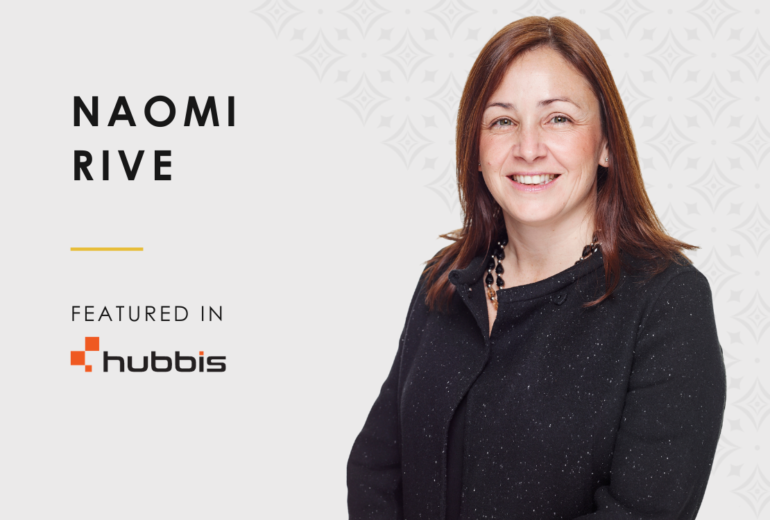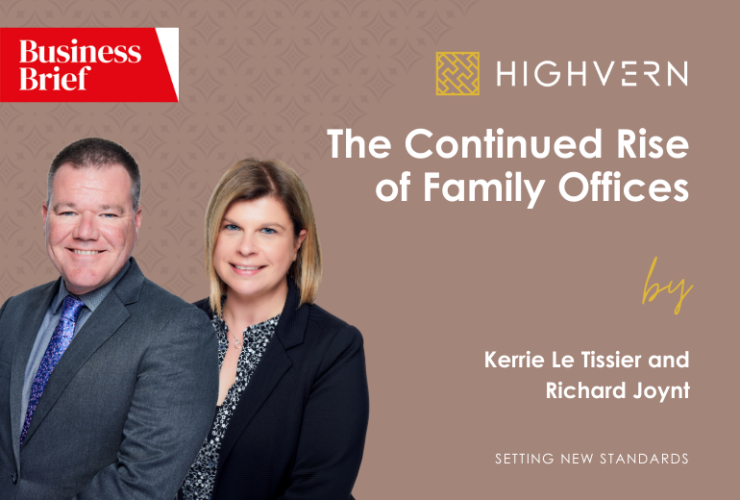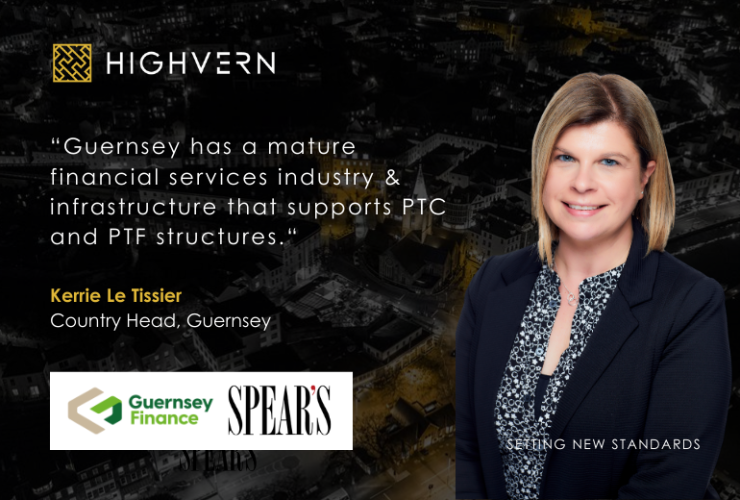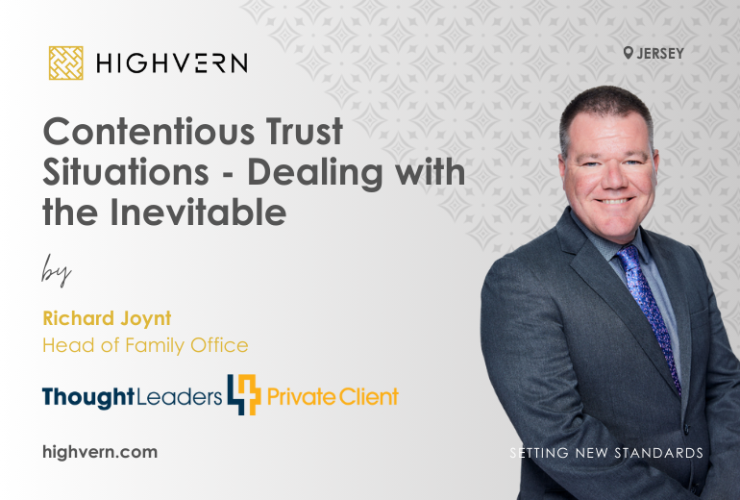
As featured in Hubbis
Jersey Fiduciary HIGHVERN on its Missions for Wealthy Clients in Asia and the Middle East
Naomi Rive is a Group Director and Head of Private Wealth at HIGHVERN, the Jersey-based fiduciary and fund services provider first founded in 1969, then controlled by a leading UK private bank and in 2016 acquired by the incumbent management team, which continues to drive the business forward today. In late 2020, Hubbis had the pleasure of ‘meeting’ with Naomi to discuss all things wealth management, and to hear exactly why and how HIGHVERN is building its client base around the world, leveraging its history, expertise, and its deep empathy with HNW and UHNW clients in wealth structuring, administration, governance and advisory services across a wide range of individuals, families, family offices, fund managers and family-owned corporates.
Rive is a lawyer by training and was called to the English Bar in 1999, then re-qualified as a Jersey Advocate in 2003 and rose to partner at law firm Appleby, where she provided wealth-structuring advice to high and ultra-high net worth individuals, international private banks and trust companies.
She joined HIGHVERN in 2014, when it was still owned by Coutts, and today heads a team delivering robust and sustainable private capital and wealth planning structures to private clients either directly or via their Family Offices. Rive is a board member of HIGHVERN’s private client and funds boards as well as a substantial number of private trust companies and family investment companies. She is also a former Chair to the Society of Trust and Estate Practitioners (STEP) in Jersey and a former adjunct Professor of Law at the Jersey Institute of Law.
A universe orbiting core values
This impressive background sets her in good stead to deliver solutions in an ever-more complex world in which regulation is constantly shifting, but in which the values of client service remain constant.
“I originally moved from practising law to working within the trustee industry because I had seen first-hand that families really benefitted from having ongoing legal influence and input during the life of their structure and often got into difficulties where this wasn’t available to them,” she reports. “I moved to the Coutts Trust Company in Jersey in 2014 and was immediately involved in complex structuring and restructuring, dealing with numerous facets and issues helping families evolve or remediate their optimal structures. And then the management, including myself, bought out HIGHVERN in 2016. This change of ownership has been a huge bonus as independent trusteeship is highly valued by so many of our clients and allow us to offer a wider range of services to our diverse and international client base.”
Building on history in Asia
She explains that an independent trust company is precisely the sweet spot in terms of what so many clients want nowadays. They are very aware of the conflict-of-interest issues of their trustee being part of a bank or larger organisation, and with the influx of so much private equity into this industry, the ownership profile of trustees has changed significantly and continues to do so.
Rive reports that roughly one-third of HIGHVERN’s client book originates from Asia, predominantly Hong Kong and Singapore, with Coutts in Asia having built the foundations there originally long before the 2016 buyout.
Catering to specific needs
She explains that her Hong Kong clients and Singapore clients have somewhat different needs, with the Hong Kong business focussed mostly on families, family business interests, and family offices, while the activity in Singapore is still more focused on investable assets and Universal Life Insurance. There is no doubt however that Singapore is attracting a great deal of wealth and we are seeing increasingly more sophisticated structuring originating from the region.
“With the arrival in recent years of CRS, FATCA and now economic substance,” Rive reports, “we have had the opportunity to really develop our relationships with key clients and structures, and develop new clients and delivered for them, all of which has been very encouraging. With concerns over Hong Kong, families there have really focused on ensuring they have robust trustees in jurisdictions that they know and respect, and for good reason often these are outside the region.”
Building the Middle East client base
HIGHVERN has also had a long history in the Middle East through its Coutts heritage, and HIGHVERN is leveraging that to build the book of clients even more rapidly there. Rive explains that it is also a market with its own specific structuring requirements, in an easier time zone for Jersey and of course, closer for travel in more normal times.
“Many of our Asian clients are self-made, first-generation entrepreneurs, whereas much of the Middle East clientele has inherited wealth, so there are different dynamics to work with,” she explains. “As to Asian clients, it is stimulating and educational working with families that are still so active within family businesses, and very often we enjoy dealing not only with the patriarch, who has so much to experience to share, but also with the children who are very respectful of how much hard work went into accumulating the family wealth.”
Reaching out further in Asia
Many Asian clients, she reports, are still cautious about the true value of wealth structuring. This sometimes creates hurdles to overcome in terms of fees as fiduciary structures are long term that don’t necessarily show an obvious, immediate benefit. “But when one considers the vast wealth at stake,” she says, “families do need to spend a reasonable fee on high-quality professional services to manage the risks out there. Naturally, the pandemic has accelerated the understanding of these requirements, especially in relation to the succession planning around family businesses and legacy planning.”
Rive explains that HIGHVERN is today roughly 65-strong, comprising many seasoned private wealth practitioners who are highly committed to the sector. “We have five client directors who in normal times all travel extensively, and our team starts at six o’clock in the morning to give us more of an overlap with the Asian and Middle Eastern markets. We’ve done that for several years, which is somewhat unique still on Jersey.”
Rising to the challenges
She explains that Covid has given rise to unique challenges for some clients, for example, in some cases the patriarch or the matriarch have acutely felt the absence of an ability to have physical meetings. They have missed having the necessary professional support around them and struggled to adapt to using digital communication technologies.
“In many cases,” she says, “they have looked to the next generations to support them, and to engage with the trustees on their behalf, and that has flushed out a few issues, for example when the second or younger generations are not well informed about the structures, the assets they hold or indeed the role of the trustees. But, on the other hand, it offers a great opportunity to advance that transition of the wealth to the next generations and really given us an opportunity to get to know the nextgens, even though it is better not to connect at first during a crisis. It is a lesson for all concerned.”
She adds that the turmoil experienced by Hong Kong in particular in 2020 by the local riots and of course the pandemic, has shone a spotlight on vital areas such as succession planning, governance issues and board structures, and so forth. It isn’t just Asian clients experiencing these challenges of course and the United States has also witnessed a spike in wealth planning arising out of political uncertainty. “Putting a wealth structure in place doesn’t need to be too onerous,” she says, “it can in fact be done very quickly but still too often for Asian families, they are reluctant to discuss these issues. Then, when circumstances dictate that action is required quickly it is difficult to extract all of the necessary information from a key person, who also controls the assets or family business shares, and this can all cause major issues.”
Singapore beckons
Rive believes there are excellent opportunities for Jersey to partner with Singapore in certain areas. She observes that Singapore has done a fine job of enhancing its reputation as a centre for asset management and family offices and that many Middle East clients, as well as Asian families, are considering locating and structuring their assets there.
“But Singapore is also an expensive market to enter and takes time to develop, so we have in the past seen law firms and other service providers withdraw after only a few years,” she notes. “At the moment we prefer simply to partner with a number of key intermediaries and family offices.”
Boosting the trust proposition
Rive believes high-quality trusteeship is a key area of development needed in Singapore. “There are many good corporate services providers out there, lots of good lawyers and accountants and practices, but they need experience and professional trustees, and that is where we are seeing good interaction and partnerships between Singapore and Jersey.”
She reports that she is, for example, working on one relationship at the moment involving a trust and company structure holding valuable intellectual property rights. “Singapore works very well as the corporate jurisdiction of choice, but Jersey remains the jurisdiction of choice for the governing law of the trust and for the choice of trustee,” she elucidates. “We work very closely with the corporate services provider to make sure that the corporate in Singapore is administered effectively, that they understand the requirements for economic substance, and the integrity of the structure upheld.”
Family offices
Rive sees another trend of more professionals moving into single-family offices and a lot more single-family offices being set up. At HIGHVERN, she explained that they have a number of excellent relationships with family office professionals. But she also cautions, from experience, that there is a danger that the person the family brings in to manage the family office can in due course themselves become a key man risk, or worse, they may become the sort of gatekeeper who is a blocker preventing the family obtaining outside expertise. “A number of families have discovered after several years that they’ve lost control of their own relationships with people like ourselves,” she says, “and that is a negative for both us and the family.”
She also comments that to a large extent, HIGHVERN has many of the characteristics of a governance focused multi-family office, acting as the central point of contact with the families and ensuring they are appropriately advised.
“What we often find it to be that the best scenario is for a family member to be central in relation to wealth succession and management of the family assets,” she explains, “and then have a team of people including the family office and professional partners like us combining to achieve the best solutions and outcomes. Handing over absolute control to any one person can be a high-risk strategy. A more effective and creative solution is the creation of a high-performing, multi-disciplinary team within built checks and balances to mitigate risks.”
Key Priorities
Rive reports that her first priority is HIGHVERN’s continued investment in further building a dynamic and high-quality team. “Our team has adapted to remote working extremely well but we have all missed the ability to spend time with family and to travel off Island. When borders open up we will need to meet that challenge of juggling holiday requests for a few months but through building a strong and diverse team I am confident that we will still be able to put our client relationships first and keep up our high levels of service. One comment that we hear regularly from clients is that they like continuity in terms of the people they deal with here, knowing that their calls and emails are replied to by people they know, and trust is important to them.”
A second objective is to expand from being exclusively a Jersey-based business. “We plan to move into another couple of strategic jurisdictions during 2021, but we have protected the reputation we have built and will do this cautiously. We want to ensure that we always maintain a high-quality book of clients, that we have the right culture and work ethic within our offices and that we are respected by the intermediaries and regulators in the jurisdictions that we operate in,” Rive reports. At present the mid-shore jurisdictions are particularly attractive because they tend to have good infrastructure and legal regimes as well as a domestic and international client base.
The third priority is education. “It is vital to help our clients and their families understand wealth planning concepts and structures,” she says. “So, as soon as we can, we want to get out and about to conferences and events and project our ideas, network and to build for the future.”
Rive closes the discussion by reiterating that she has great hope that 2021 will see the resumption of travel, as HIGHVERN operates in a space in which the building of new clients is so heavily based on the personal relationship and chemistry, that is, of course, very tough to build on Zoom calls or other remote means of communication. “We enjoy meeting our clients,” she says, “many of whom have lived fascinating lives. I value greatly the close professional relationships that we at HIGHVERN take such pride in building.”
Getting Personal with Naomi Rive
Rive hails from Jersey originally and was educated locally, then went to Birmingham University to study law, and qualified at the English Bar in London, having attended the Inns of Court School of Law.
After spending her early years travelling around the Central and South Eastern circuit of the London Bar in England, she returned to Jersey, where she enjoyed some great challenges in the litigation team at Ogier. “Within the first couple of years, I had been involved in some fantastic quality work including a shareholders dispute that was being reported on the front page of The Times and countless pieces of trust litigation. Being involved with such high-profile litigation was a real eye opener and a great experience.”
Her next step was to move from legal practice into the trust sector, a mover that she says has worked out very well for her career and her personal satisfaction.
“It might sound something of a cliché,” she says, “but it is a privilege to work with many of these clients and their families. You have to step into their shoes as a fiduciary and, as we are all taught at law school, act as if the wealth is your own, but equally being very respectful that it isn’t your own wealth, and that someone has put their trust and confidence in you. You are in a privileged position, often engaging with families at the most difficult of times and hearing many of their secrets, but of course offering them complete confidentiality.”
Rive is married to another lawyer, and they have two children aged 11 and 9 years old. “Both boys are crazy about football and computer games,” she reports, “and far from thinking about careers in the law, thankfully.”
Rive longs for a return to normality and to enjoy family travels one again. She dreams of having a second home somewhere the only problem is that she changes her mind every time they have been anywhere new.
The last major family trip was to California for three weeks in 2019. “We loved the coast there,” she reports. “In the past, we also really loved a campervan trip to New Zealand and are always keen on Asia, for example, we visited Vietnam when the boys were only four and six. Crossing the roads with two young children was rather dangerous, but we loved the experiences there and the culture.”


